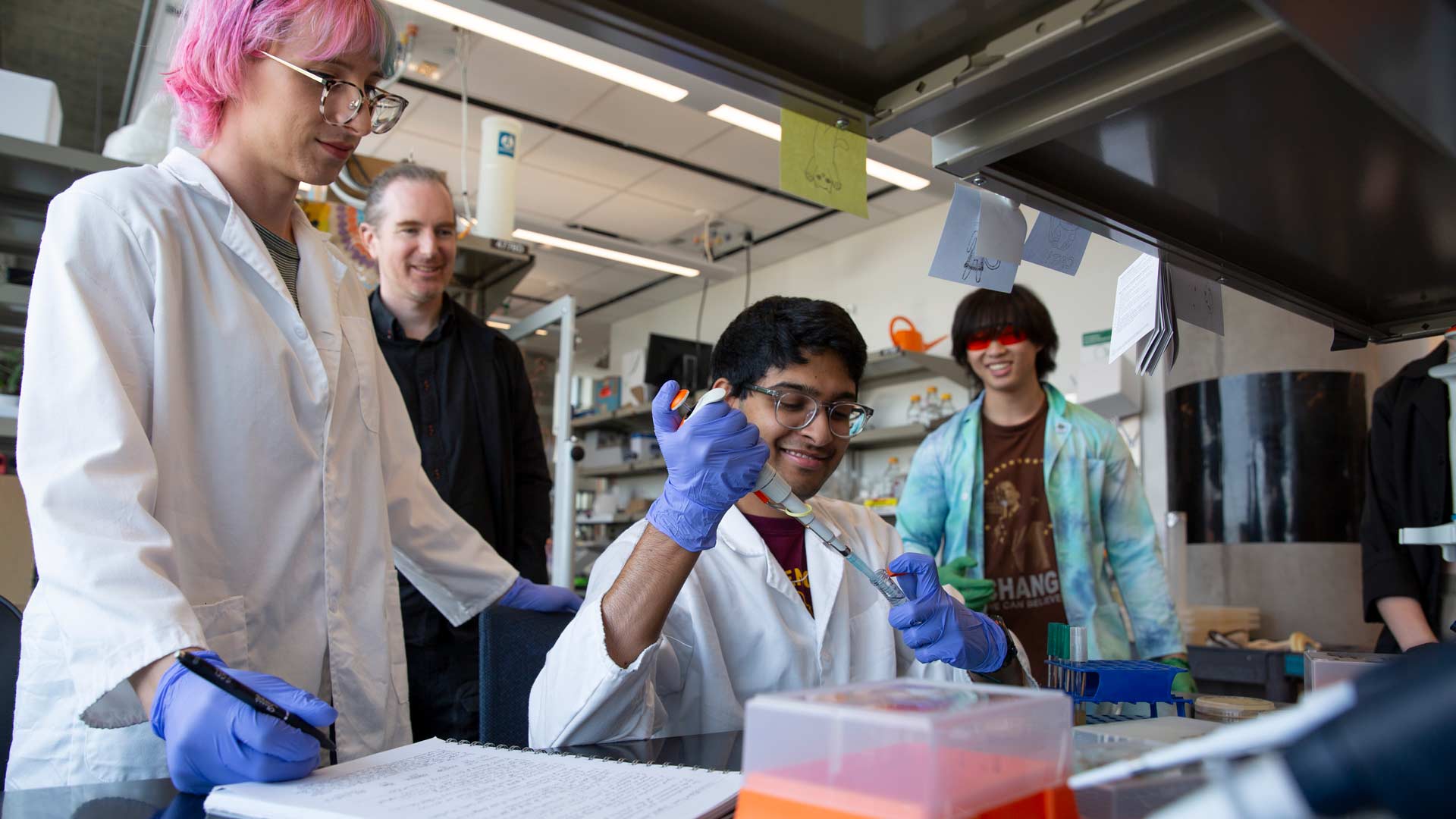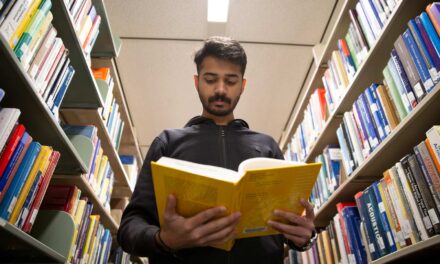
Award-winning iGEM team to compete in international competition
ASU students are using synthetic biology to engineer bacteria that could safeguard drinking water from forever chemicals

In the bustling realm of academia where students are often directed by curriculums and coursework, Arizona State University’s award-winning International Genetically Engineered Machine, or iGEM, team empowers students to design their own research projects.
The International Genetically Engineered Machine Foundation, or iGEM Foundation, hosts an international event called the Grand Jamboree which challenges college students to tackle local environmental issues using synthetic biology principles.
More than 400 multidisciplinary student-led research teams that pass the preliminary requirements converge at the competition to present their synthetic biology projects. The projects are designed to benefit academic institutions, municipalities, nonprofits, startups, industry professionals and investors. Past iGEM members say that while attending seminars and networking with academic and industry professionals, they’ve met the authors of papers they’ve cited in their projects.
The team’s activities are generally directed by the students themselves. Christopher Plaisier and Benjamin Bartelle, assistant professors of biomedical engineering in the Ira A. Fulton Schools of Engineering at ASU, provide mentorship and lab space as well as an official class BME 494: Synthetic Biology for weekly meetings.
Though Bartelle leads the class, students manage the design, building, testing, execution and analysis of the project. From generating a research topic to conducting experiments and everything in between, iGEM students are engaged during the entire research process.
Bartelle says the type of mentorship he provides for iGEM students is different due to the independent nature of the program.
“I do not tell them what to do,” Bartelle says. “The spirit of iGEM is to learn by failing fast and often. This is one of the rare occasions in their education where they have that opportunity. Sometimes they surprise me with things I hadn’t considered which is very rewarding. Seeing the team’s skills accelerate and how they’re finding their scientific voice really makes my day.”
Fighting off forever chemicals
The 2023 cohort is collaborating to engineer bacteria to aid in the breakdown of per- and poly-fluoroalkyl substances, or PFAS in drinking water. PFAS, which is used in Teflon in nonstick pans, waterproof mascara and countless other household products, was originally renowned for its stability due to a strong carbon-fluorine bond. PFAS has since been discovered to disrupt hormone regulation and cause a range of health effects, including cancer and liver damage, decreased fertility and an increased risk of asthma and thyroid disease. Due to the stability of the carbon-fluorine bonds, PFAS will take several thousand years to dissolve, earning it the nickname of the “forever chemical.”
Brianna Branson, a biomedical engineering sophomore and member of the 2023 iGEM team, says there are currently no sustainable solutions for managing PFAS.
“The Center for Disease Control found that around 97% of Americans have some level of PFAS in their blood system,” Branson says. “It’s a huge problem that we have difficulty tackling because there isn’t really any effective way of breaking this down. Our goal is to create a bacteria that will biodegrade the PFAS chemical to remove it from the ecosystem.”
At present, the team is developing the bacteria’s metabolic abilities and is on track to see defluorinating activity that will break down the strong bonds holding the chemical together by September.
Pranav Bhavaraju, a chemical engineering sophomore and member of the 2023 iGEM team, believes in the methods that the team is developing.
“Bacterial enzymes are catalysts by nature and can be very powerful,” Bhavaraju says. “By engineering bacteria to remediate a synthetic chemical, we can make an impossible reaction possible. That bacteria holds that much power.”
iGEM Grand Jamboree success
Priyati Sharma, a biomedical engineering senior and member of the 2021 and 2022 iGEM cohorts, says that participating in iGEM has made her feel well-equipped for her future career as an engineer.
“As an undergraduate student, it’s rare to find opportunities to be solely in charge of the progress of your own research,” Sharma says. “However, being thrust into a learning environment like the iGEM competition means you have to develop those skills pretty quickly, which is intimidating, but it allows you to grow a lot as a researcher in a short amount of time.”
This will be the ASU iGEM team’s third consecutive year participating in the international competition, having earned gold and bronze rankings in 2021 and 2022, respectively, and they hope to continue their medal-ranking streak this November at the Grand Jamboree in Paris.
iGEM is challenging students from multiple disciplines to leverage the strengths and knowledge of each member to apply engineering principles of design, building and testing. The ASU students who are tackling these grand challenges are shaping the future and contributing to a better world with their impactful work.
Update (Nov. 6, 2023) — ASU iGEM team members attended the Grand Jamboree in Paris, France, from November 2–5, 2023, along with 400 other teams from 66 countries, where they were awarded a bronze medal.
The team presented its research on modifying E.coli bacteria to consume and dispose of PFAS, a hazardous water contaminant, to panel judges and had their work critiqued by peers.
Brianna Branson, a biomedical engineering sophomore and 2023 iGEM team member, notes that today’s generation of synthetic biologists has the potential to change the industry’s landscape through experiences such as iGEM.
“It’s not often that an undergraduate student gets the opportunity to start and finish an entire research project,” Branson says. “I’m awash with pride in the work that we accomplished and am already excited for next year.”
Patrick Jiang, a computer science sophomore and co-lead of the 2023 iGEM team, says team members could not run all of the tests they planned due to time constraints, a common concern among iGEM teams.
“We were granted an amazing opportunity to learn all about the efforts of other teams, as well as network with people overseas,” Jiang says.
The ASU team enjoyed a range of networking opportunities at the convention, including connecting with two other teams from Denmark that were also working on PFAS-related projects involving novel approaches to the same problem.
The team is looking for motivated and creative students to join its ranks for the 2024 cohort. Students from all academic backgrounds are encouraged to join. Those who are interested can learn more by attending a DIYbio club meeting.
iGEM team members
Rori Hoover, Co-Captain, Biomedical Engineering
Patrick Jiang, Co-Captain, Computer Science
Brianna Branson, Biomedical Engineering
Isabella Lirtzman, Biological Science
Evie Nguyen, Biochemical Engineering
Caden Elizalde, Global Health
Anwar Gadhi, BSE Biomedical Engineering(graduate)
Kylie Hartana, Biomedical Engineering
Tahmid Anwar, Biomedical Engineering
Pranab Bhavaraju, Chemical Engineering



































